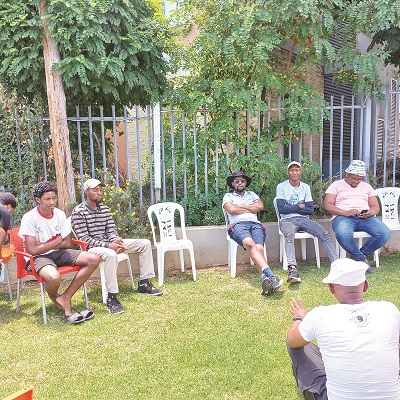By:T’soloane Mohlomi
The Jabari Men’s Club recently hosted a Men’s conference in Moshoeshoe II in Maseru, this in order to discus and address issues and challenges mainly facing and affecting men in the modern age.
Hosted under the auspices of International Men’s Day, which is celebrated every year on the 20th of November, the day itself focused on appreciating the value and contributions made by men in society, families and communities in general.
With men uniquely impacted by diseases such as prostate and testicular cancer and the estimated suicide rate in the world for men has doubled compared to that of women, men’s health and overall well being has since come under the spotlight in recent times, with indicators showing a need for urgent action.
Hosted in collaboration with Bokhabane Counselling Services the session covered issues ranging from men’s general health (especially mental health), constraints which are hampering men’s success in the modern world and the prolonged associated stigmas which affect them, needing to be rectified.
Jabari International is a non-Governmental Organisation which was founded in 2020, by Ms Mookho Ndlovu who currently resides in Canada. The organization aims to deal and counter mental health problems in the world starting in the mountain Kingdom.
Speaking in an exclusive interview with the Informative Newspaper, Jabari International’s Communication Coordinator Mr Malefane Pallo, said it had come to their attention that men had in a way been sidelined in the society. Where they had observed that men’s rights, issues and problems were constantly overlooked, as though men didn’t matter, and as if they were not fellow human beings who needed support when dealing with their day to day problems, in a complex and challenging world.
“What particularly influenced us to hold this event today in commemoration of International Men’s Day is that, we are aware that lately men have been sort of sidelined in society to an extent, as you rarely find events of this nature where we want to specifically cater and address matters affecting men,” he said.
“We found a lack in that area, and aim to address it. A lot of things happen in our society, a lot of crimes and unfortunately as far as men are concerned a lot of them are implicated in a lot of these incidents which include risky lifestyle behaviours like risky sexual behaviours, drug abuse and others.
“So we wanted to have more open sessions like these ones, where men could talk openly and freely about their issues and what is really bothering them, and how we could possibly help each others with advices on mitigating and circumventing.
“We want you to know that you are not alone with whatever issue you are facing as a man in this society, because you find that the society is very patriarchal as men have very limited support systems in these issues as opposed to women.
In addition he said they deemed it important to hold an event of this nature where communication could be very open and very free without the feeling of needing to hold back.
In collaborating with Bokhabane Counselling Services Mr Pallo said they intended to share expertise in the mental health Sector, so they can help men with the best possible advises as they have a common enemy.
On his part Mr Moeketsi Seturume from Bokhabane Counselling Services during the session, using different scenarios and practical examples, spoke to attendees about the importance of mental well being, he said it was important to do away with certain cultural statements such as “real men don’t cry” because in order to cope with the issue it is important to admit that you are not coping and seek help.
“It’s okay not to be okay and it’s important to admit that. Certain things have been holding us back for a long time, certain ideologies and cultural norms but to cope in this modern world we need to change certain stereotypes and practices so we can avoid these high levels of suicide in the future.
One of the participants Mr Khosi Pheko alluded to how the session had helped him see things differently and gain a better understanding of mental issues. The men were treated to a braai after the session.


